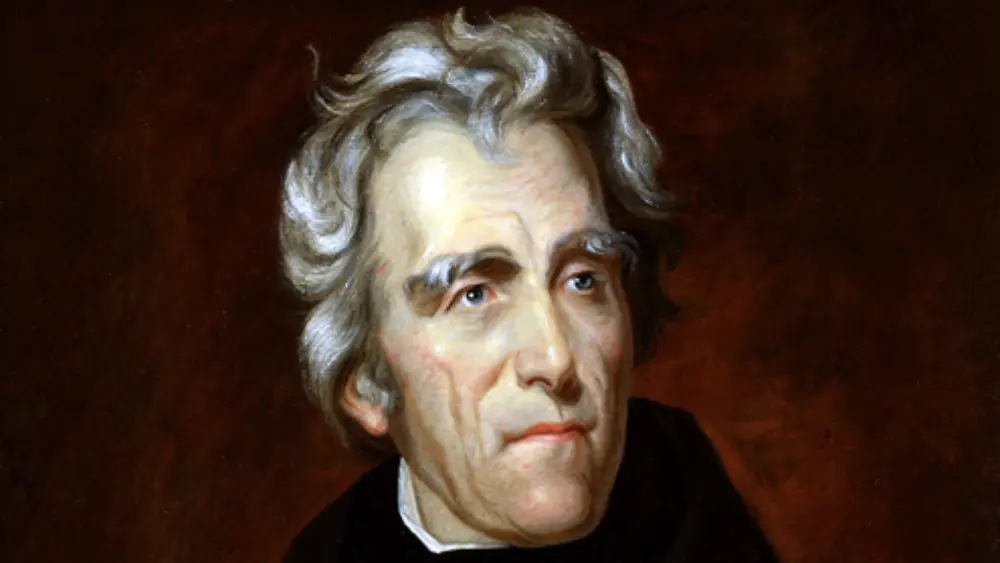Andrew Jackson, born on March 15, 1767, in the Waxhaws region along the border of North and South Carolina, was the seventh President of the United States and a central figure in American history.
Early Life and Military Career
Adversity and hardship characterized Andrew Jackson’s formative years. Born into a family that had already experienced tragedy with the death of his father shortly before his birth, Jackson faced the challenges of growing up in humble circumstances. Limited access to formal education marked his early life, but his determination, resilience, and innate intelligence set him apart. Jackson’s remarkable journey began to take shape when, at the age of 13, he joined a local militia, signaling the onset of his lifelong commitment to public service and military endeavors. This early exposure to the world of military service would pave the way for a remarkable military career.
Andrew Jackson’s trajectory into the military was further solidified as he became embroiled in the Revolutionary War effort. His active involvement in the struggle for American independence marked the beginning of a military career that would see him rise to prominence and ultimately shape the course of American history. Jackson’s early experiences instilled in him the values of perseverance and resilience, laying the groundwork for his future as a distinguished military leader and statesman.
Andrew Jackson: Political Rise and Presidency
Andrew Jackson’s foray into politics marked a significant turning point in American democracy. His political journey culminated in his historic election as the seventh President of the United States in 1828, a triumph that not only reflected his widespread popularity but also signaled a shift in the nation’s political landscape. Jackson’s ascent to the presidency was a testament to his ability to connect with the American people and tap into the sentiments of the era.
Jackson’s presidency, spanning two terms from 1829 to 1837, marked a series of transformative events and policies. He characterized his leadership style with a strong executive approach and played a central role in shaping the office of the presidency. His administration oversaw significant developments, including the removal of Native American tribes from their ancestral lands, the expansion of suffrage to a broader segment of the population, and the dismantling of the Second Bank of the United States. Jackson’s presidency left an indelible mark on American politics, and his legacy, though complex and contested, continues to be a subject of historical reflection and debate.
Legacy and Controversy
Andrew Jackson’s presidency, undeniably influential in shaping American politics, has generated both acclaim and criticism, making it a subject of enduring debate and controversy. He is widely celebrated as a champion of the common man, lauded for his efforts to expand the concept of democracy by advocating for broader suffrage and challenging the entrenched political elites of his time. Jackson’s populist approach, often referred to as Jacksonian Democracy, fundamentally altered the political landscape, emphasizing the importance of ordinary citizens’ voices in shaping the nation’s destiny.
However, Jackson’s legacy is also marred by contentious policies, particularly his treatment of Native Americans and his role in perpetuating slavery. His administration oversaw the forced removal of Native American tribes from their ancestral lands in what became known as the Trail of Tears, a tragic episode in American history that resulted in immense suffering and loss of life. Additionally, Jackson’s support for slavery and his ownership of enslaved individuals are glaring contradictions to his democratic ideals. These aspects of his legacy continue to spark debate and reflection, serving as a reminder of the complexities and contradictions that often define the legacies of influential historical figures.

Andrew Jackson: Personal Life and Retirement
Andrew Jackson’s personal life was characterized by moments of both triumph and profound tragedy. Shortly before his inauguration as the seventh President of the United States, Jackson experienced a devastating loss when his beloved wife, Rachel, passed away. The emotional toll of her death cast a shadow over the early days of his presidency, a reminder of the personal sacrifices and hardships he endured in the pursuit of his political career.
After leaving the presidency, Jackson retired to his beloved estate, The Hermitage, located in Tennessee. It was here that he sought solace and peace in the twilight of his life. Surrounded by the natural beauty of his estate, he lived out his remaining years until his death on June 8, 1845. Jackson’s retirement marked the end of a remarkable era in American history, and his legacy, both as a military hero and a controversial political figure, continued to shape the nation long after his passing. His time at The Hermitage allowed him to reflect on his eventful life and the profound impact he had on the United States, leaving a lasting imprint on the annals of American history.




